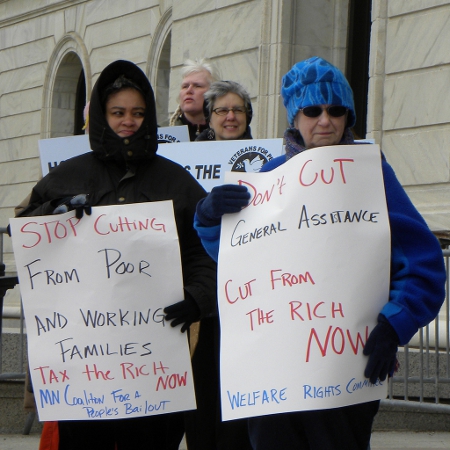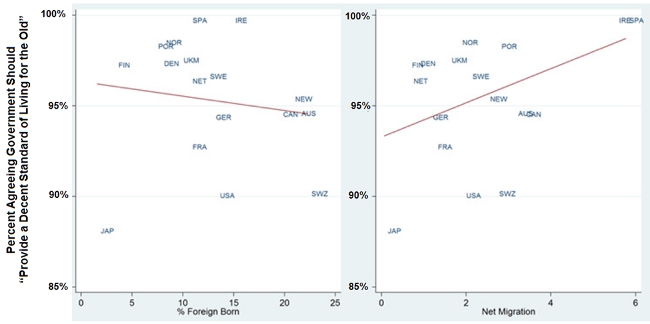
 In the U.S and other rich democracies, many commentators have linked the rise of anti-foreigner sentiments in recent decades with rising levels of immigration. But do higher levels of immigration also undermine public support for social policies? Using survey data from 17 rich democracies, David Brady and Ryan Finnigan find little evidence to support this claim. They write that immigration may even surprisingly encourage public support for the welfare state.
In the U.S and other rich democracies, many commentators have linked the rise of anti-foreigner sentiments in recent decades with rising levels of immigration. But do higher levels of immigration also undermine public support for social policies? Using survey data from 17 rich democracies, David Brady and Ryan Finnigan find little evidence to support this claim. They write that immigration may even surprisingly encourage public support for the welfare state.
In the last few decades, Europe and other affluent democracies have conducted something like a natural experiment. While rising immigration to the United States is well known, most of Europe’s rich countries have also experienced a surge of immigration in a relatively short period of time. The starkest cases were Spain and Ireland, but almost all the affluent democracies experienced this migration surge. In Spain, the percentage of foreign born quadrupled from 2.6 to 10.6 percent of the population from 1996 to 2006. At the same time, Ireland went from having more out- than in-migration in 1996 to a country that had more than 5 percent in-migration by 2006. This remarkable increase in immigration was layered on top of the already notable cross-national differences in immigration. In Australia, Canada, New Zealand and Switzerland, about 20 percent of the population was foreign born in 2006, while Finland and Japan continued to have only a small share foreign born.
Social scientists have exploited this striking social change to better understand how immigration and ethnic heterogeneity affect attitudes, politics and behavior. For example, there is evidence that the rising immigration to Europe in the 1990s triggered a rise in anti-foreigner sentiments, and extreme Right parties have reemerged in a number of countries. In our recent research, we have investigated if rising immigration has undermined public support for social policy. More specifically, we looked at whether a country’s level of immigration has a negative relationship with an individual’s belief in, and preferences for, social policy.

Whether immigration undermines public support for social policy is especially important given many scholars and commentators have argued that ethnic heterogeneity undermines public goods. The argument has been that when a country is more ethnically divided, people become reluctant to support social policies that might enhance social equality and the well-being of vulnerable groups. Purportedly, ethnic fractionalization reduces one’s sense of solidarity with other residents. This argument partly emerges from a long tradition of scholarship claiming that ethnic homogeneity facilitated the development of the welfare state. The argument goes that the U.S. has a much weaker welfare state than say Sweden because Sweden was ethnically homogenous and the U.S. was ethnically divided. Further, as Sweden encounters rising immigration and the ensuing heterogeneity, it will converge on an American welfare state because Swedes will no longer support social policy when the beneficiaries are Turks or Somalis. Scholars have also provided experimental and observational evidence to show that ethnic heterogeneity makes people less willing to invest in public goods.
To conduct our analysis, we utilize the 1996 and 2006 International Social Survey Programme (ISSP), which featured a wide variety of questions on whether respondents support social policy. For example, two of the six relevant questions ask: “Does the government have responsibility to reduce income differences between rich and poor” and “Does the government have responsibility to provide a job for everyone who wants one?” With multilevel models, we analyze data on 17 rich democracies merged with data on a country’s immigration flows and stock. Flows measure changes in incoming and outgoing immigration, while stock measures the immigrant share of the population at one point in time.
Our strategy was to estimate a large number of models to carefully assess if the relationship between immigration and support for social policy was robust. We examined three different measures of immigration across the six survey questions, and considered a wide variety of control variables at the individual (e.g. a respondent’s income) and country-level (e.g. the employment rate in the country). We analyzed differences between countries as well as change over-time within countries. In short, we tried to provide the most comprehensive test to date.
Much to our surprise, and contrary to the vast group of scholars and commentators, we found very little evidence that immigration actually undermines public support for social policy, as Figure 1 illustrates. The stock of immigration also had no effect in about two-thirds of the models. The one exception was that the stock of immigration appears to undermine support for the belief that “government has a responsibility to provide a job for everyone who wants one.” However, this piece of evidence is modest compared to the much more robust evidence that flows of immigration actually tend to increase support for social policy. Indeed, we find that both net migration and the over-time change in the percent foreign born increase the odds that respondents believe governments have a responsibility to provide housing, healthcare, pensions, unemployment assistance, and to reduce differences between rich and poor.
Figure 1 – Association between support for providing decent living standard for the old and net migration and % foreign born in 17 affluent democracies

How does one make sense of our mostly null results, the unexpected positive effects, and the sole negative effects on the jobs question? We stress first and foremost that the null results are the prevailing pattern. Our analyses mostly fail to show any effect. Hence, the correct and most appropriate interpretation is that other factors are far more important to public support for social policy. This does not mean that people are supportive of immigrants or immigration. Rather, it means that people often divorce any hostility to immigrants from their beliefs about social policy. Ultimately, we encourage scholars and commentators to back off the bold claims about immigration and social policy. Greater caution and fewer “universal” theories would improve how scholars and commentators discuss the relationship between ethnic heterogeneity and the welfare state.
Despite our plea for greater caution and more skepticism with past arguments, we acknowledge it is at least worthwhile to speculate on the other results. We interpret the positive effects of immigration flows as consistent with the “compensation hypothesis.” In an environment of rapidly increasing immigration, respondents may feel insecure and even threatened by the uncertainty and competition that immigration represents in their minds. This context of unstable social change prompts respondents to seek relief and protection from the state. The acute increase in immigration may lead people to demand the state to protect them rather than prefer the government recede from helping people. For the unique results of immigrant stock and the jobs question, we interpret the evidence as consistent with the “chauvinism hypothesis.” It could be that respondents view jobs as a zero-sum competition for a finite resource. Perhaps also respondents think if the government provides a job for “everyone who wants one” they are especially thinking of immigrants and are less willing to support social policies that might help immigrants attain the same standard of living as natives.
Despite these possible interpretations, our major conclusion is that immigration does not undermine public support for social policy. Even though many have argued that there is a “progressive’s dilemma” or “heterogeneity/egalitarianism tradeoff,” our study mostly contradicts these views. It appears to be entirely possible for countries to be ethnically heterogeneous and economically egalitarian. The rise of immigration does not truly contradict or challenge a public’s willingness to protect the poor, the sick, unemployed or old. In the end, a far more promising question is how, why, where and when does rising ethnic heterogeneity complement or coexist with economic egalitarianism.
This article is based on the paper, “Does Immigration Undermine Public Support for Social Policy?” in the American Sociological Review.
This article has also been published in Spanish at Agenda Publica.
Please read our comments policy before commenting.
Note: This article gives the views of the authors, and not the position of USApp– American Politics and Policy, nor of the London School of Economics.
Shortened URL for this post: http://bit.ly/1fjPM5B
_________________________________
 David Brady – WZB Berlin Social Science Center
David Brady – WZB Berlin Social Science Center
David Brady is Director of the Inequality and Social Policy Research Unit at the WZB Berlin Social Science Center. His main fields of interest are poverty and inequality, in particular their causes, measurement and consequences. His book Rich Democracies, Poor People: How Politics Explain Poverty (Oxford University Press, 2009) analyzes how politics explain why poverty is so much higher in the US than in other affluent democracies.
 Ryan Finnigan – WZB Berlin Social Science Center
Ryan Finnigan – WZB Berlin Social Science Center
Ryan Finnigan is a postdoctoral fellow in WZB Berlin Social Science Center unit for Inequality and Social Policy. His research investigates how structural change (at the city-, regional-, and country-level) shapes inequalities in individual well-being and life chances.







